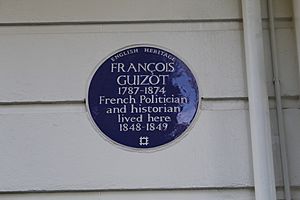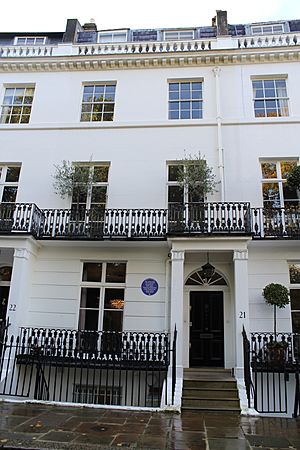François Guizot facts for kids
Quick facts for kids
François Guizot
|
|
|---|---|
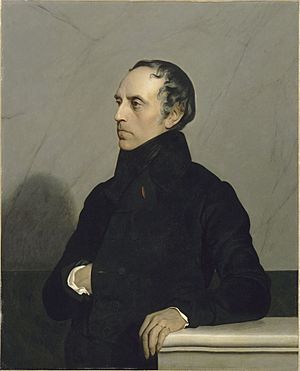
Portrait by Jehan Georges Vibert, after an 1837 original by Paul Delaroche
|
|
| Prime Minister of France | |
| In office 18 September 1847 – 23 February 1848 |
|
| Monarch | Louis Philippe I |
| Preceded by | Jean-de-Dieu Soult |
| Succeeded by | Jacques-Charles Dupont |
| Minister of Foreign Affairs | |
| In office 29 October 1840 – 23 February 1848 |
|
| Prime Minister | Jean-de-Dieu Soult |
| Preceded by | Adolphe Thiers |
| Succeeded by | Alphonse de Lamartine |
| Minister of Public Education | |
| In office 6 September 1836 – 15 April 1837 |
|
| Monarch | Louis Philippe I |
| Prime Minister | Louis-Mathieu Molé |
| Preceded by | Joseph Pelet de la Lozère |
| Succeeded by | Narcisse-Achille de Salvandy |
| In office 18 November 1834 – 22 February 1836 |
|
| Monarch | Louis Philippe I |
| Prime Minister | Édouard Mortier Victor de Broglie |
| Preceded by | Jean-Baptiste Teste |
| Succeeded by | Joseph Pelet de la Lozère |
| In office 11 October 1832 – 10 November 1834 |
|
| Monarch | Louis Philippe I |
| Prime Minister | Jean-de-Dieu Soult |
| Preceded by | Amédée Girod de l'Ain |
| Succeeded by | Jean-Baptiste Teste |
| Minister of Interior | |
| In office 1 August 1830 – 2 November 1830 |
|
| Prime Minister | Jacques Laffitte |
| Preceded by | Victor de Broglie |
| Succeeded by | Camille de Montalivet |
| Member of the Chamber of Deputies for Calvados |
|
| In office 23 June 1830 – 23 February 1848 |
|
| Preceded by | Louis Nicolas Vauquelin |
| Succeeded by | Jean-Charles Besnard |
| Constituency | Lisieux |
| Personal details | |
| Born |
François Pierre Guillaume Guizot
4 October 1787 Nîmes, France |
| Died | 12 September 1874 (aged 86) Saint-Ouen-le-Pin, France |
| Political party | Doctrinaire (1814–1830) Party of Resistance (1830–1848) Party of Order (1848–1852) |
| Spouses | Pauline de Meulan (1812–1827) Élisa Dillon (1828–1833) |
| Children | François (1819–1837) Henriette (1829–1908) Pauline (1831–1874) Guillaume (1833–1892) |
| Alma mater | University of Geneva |
| Profession | Historian, teacher |
| Signature |  |
François Pierre Guillaume Guizot (4 October 1787 – 12 September 1874) was an important French historian, speaker, and statesman. He played a major role in French politics before the Revolution of 1848.
Guizot was a conservative liberal. This means he believed in individual freedom but also in keeping some traditions. He was against King Charles X trying to take too much power. After the July Revolution of 1830, he worked to keep a constitutional monarchy in France. This is a system where a king or queen shares power with an elected government.
He served King Louis Philippe as Minister of Education from 1832 to 1837. He was also an ambassador to London, Foreign Minister from 1840 to 1847, and finally Prime Minister of France from 1847 to 1848.
Guizot was very important in making public education better in France. Under his leadership, primary schools were created in every French town. He was a leader of a group called the "Doctrinaires". They supported King Louis Philippe and believed that only people with property should be allowed to vote. Guizot famously told those who wanted to vote to "enrich yourselves" (enrichissez-vous) through hard work.
As Prime Minister, Guizot banned political meetings in January 1848. These meetings were held by liberals who wanted more people to be able to vote. This ban helped start the revolution that removed Louis Philippe from power in February 1848. This led to the creation of the French Second Republic.
Contents
Early Life and Education
François Guizot was born in Nîmes, France, into a middle-class Protestant family.
When he was only six years old, on 8 April 1794, his father was executed in Nîmes during a very difficult time called the Reign of Terror. After this, his mother was fully responsible for raising him.
Because of the French Revolution, his mother and he moved to Geneva, where he went to school. Even though his mother had strong Calvinist beliefs, she was also influenced by the ideas of Jean-Jacques Rousseau. She believed that everyone should learn a manual trade. Guizot learned carpentry and even made a table himself, which is still kept today.
In 1805, at age eighteen, he moved to Paris. He started working as a tutor and began writing for a newspaper called the Publiciste. This helped him meet many important writers and thinkers in Paris.
In 1809, when he was twenty-two, he wrote a review of a book by François-René de Chateaubriand. This review impressed Chateaubriand. Guizot continued to write for newspapers. He met Pauline de Meulan, who also wrote for the same newspaper. When she became ill, Guizot secretly wrote for her. In 1812, they married. She passed away in 1827.
In 1828, Guizot married Elisa Dillon, his first wife's niece. She was also a writer. She died in 1833, leaving him with two daughters, Henriette and Pauline, and a son, Guillaume. Henriette later became a writer like her father.
Guizot became good friends with Princess Lieven, a Russian diplomat's wife, in 1837. They wrote over 5000 letters to each other. She helped him a lot in political and diplomatic circles.
During the time of the First French Empire, Guizot focused on writing. He published a collection of French synonyms in 1809 and an essay on fine arts in 1811. He also translated Edward Gibbon's The History of the Decline and Fall of the Roman Empire in 1812. These works brought him to the attention of Louis-Marcelin de Fontanes, who appointed him to teach modern history at the Sorbonne in 1812.
He gave his first lecture on 11 December 1812. His lectures were very important and helped start a new era of historical research in France. He became well-known in Paris society and made friends with important liberal leaders.
When Napoleon fell in 1814, Guizot was chosen to work for King Louis XVIII as secretary-general of the interior ministry. However, when Napoleon returned from Elba in 1815, Guizot immediately resigned and went back to his writing.
Political Career and "The Man of Ghent"
After Napoleon's final defeat, Guizot visited King Louis XVIII in Ghent. He advised the king to adopt a more liberal policy to ensure the monarchy would last. This advice was not well received by the king's close advisors.
Later, his political opponents used this visit to Ghent against him, calling him "The Man of Ghent" and saying he was unpatriotic. However, he was actually trying to help establish a liberal monarchy and fight against those who wanted to return to absolute rule.
After the king was restored to power, Guizot was appointed secretary-general of the justice ministry but resigned in 1816. In 1819, he helped start a liberal newspaper called Le Courrier français. He also became general director of communes and departments in the interior ministry but lost this job in 1820.
During these years, Guizot was a leader of the Doctrinaires. This was a small political group that strongly supported the constitution and the king. They believed in a "juste milieu" (middle path) between absolute rule and popular government. They wanted to control chaos through a limited constitution where only the middle class could vote. They were against both the democratic ideas of the time and the old absolute power of the court. The Doctrinaires lost influence after the July Revolution in 1830.
In 1820, Guizot lost his government jobs, and his lectures were even banned. However, he continued to be an important leader of the liberal opposition against King Charles X. This was also a very active time for his writing.
He published works on representative government and political pamphlets. From 1822 to 1830, he published important collections of historical documents about England and France. He also translated Shakespeare and wrote about the history of England.
In 1828, the government allowed Guizot to return to his teaching position and the council of state. His lectures at the University of Paris made him famous as a historian. These lectures formed the basis of his well-known works, Histoire de la civilisation en Europe (1828) and Histoire de la civilisation en France (1830).
In January 1830, he was elected to the Chamber of Deputies for the town of Lisieux. He kept this seat throughout his political career. In March 1830, Guizot gave a speech in the Chamber of Deputies asking for more political freedom. The motion passed, but King Charles X responded by dissolving the Chamber and calling for new elections, which only increased opposition to the king.
When he returned to Paris on 27 July, King Charles X was about to be overthrown. Guizot helped liberal deputies write a protest against the king's actions. He believed it was a shame that the king's mistakes made a change in the royal family necessary. Once he was convinced it had to happen, he became a strong supporter of King Louis Philippe. In August 1830, Guizot became Minister of the Interior but resigned in November. He was now a moderate liberal and strongly opposed democracy for the next eighteen years. He was a firm supporter of a monarchy with limited power, controlled by a small group of middle-class citizens.
Minister for King Louis Philippe
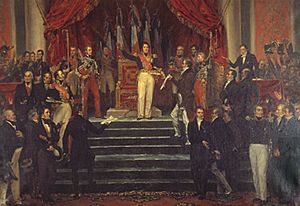
In 1831, Casimir Pierre Périer formed a new government. After Périer's death in May 1832, there was a republican uprising in Paris. It wasn't until 11 October 1832 that a stable government was formed. In this government, Marshal Soult was the first minister, Victor, 3rd duc de Broglie was in charge of foreign affairs, Adolphe Thiers was in the home department, and Guizot became the Minister of Public Instruction (Education).
Guizot was not popular with the more extreme liberal party, and this continued throughout his life. However, his skills were very useful to France during his time as Minister of Public Instruction. He loved the work because it matched his interest in literature. He focused on passing a law in 1833 that created and organized primary education across France.
Guizot also brought back the Académie des Sciences Morales et Politiques, a part of the Institute of France that Napoleon had closed. Old members like Talleyrand returned, and new famous people joined to discuss political and social science. He also founded the Société de l'histoire de France to publish historical works, and the government paid for a huge project to publish medieval chronicles and diplomatic papers.
In 1839, the July Monarchy faced threats from Louis-Mathieu Molé. Guizot, along with other leaders, worked together to stop Molé. Guizot then accepted the job of ambassador in London, which took him away from political fights for a while. This was in the spring of 1840, and Thiers soon became the Minister of Foreign Affairs.
Guizot was welcomed warmly by Queen Victoria and London society. His writings were highly respected. He truly believed in the alliance between France and Britain and wanted peace. He also helped arrange for the return of Napoleon's ashes to France, as requested by Thiers.
However, the situation with the Syrian War was complicated. France had a different policy from the rest of Europe. Guizot warned Thiers about the situation, but Thiers did not believe him. A treaty was signed without Guizot's knowledge, and Europe seemed close to war. The king ended the crisis by refusing Thiers' military plans and calling Guizot back from London to form a new government.
The Second Soult Government
On 29 October 1840, Guizot began his important role as the main leader of the government for almost eight years. He became Minister for Foreign Affairs. When Marshal Soult retired, Guizot became prime minister. His first goal was to keep peace and restore good relations with other European countries. He succeeded, which made the moderate liberal party stronger because they felt they had a great leader.
During Guizot's time as foreign minister, he worked well with Lord Aberdeen, the British foreign secretary. This helped create a friendly relationship between France and Britain, known as the entente cordiale. This friendship grew stronger when Guizot helped bring Napoleon's ashes from St. Helena back to France.
Some people in France criticized Guizot's foreign policy, saying he was too submissive to England. He responded with great disdain, saying, "You may pile up the calumny as high as you will; you will never reach the height of my disdain!" In 1845, British and French troops even fought together for the first time in the Anglo-French blockade of the Río de la Plata.
When the British government changed in 1846, Palmerston became the foreign minister. Guizot felt that he was again facing strong competition from Britain. There had been an agreement between the two countries about the future marriage of the young queen of Spain. However, Guizot believed that Britain broke this agreement, leading to the Affair of the Spanish Marriages.
Guizot and the king quickly got involved in a counter-plan. This plan went against their earlier promises to Britain and was not good for the queen of Spain. They pushed her to marry a less desirable member of the Bourbon family. At the same time, her sister married the French king's youngest son, which directly broke Louis Philippe's promises. This event, though seen as a victory for France at the time, actually harmed the king and the minister. It was done secretly and forcefully.
This event immediately ended the alliance between Britain and France. It also pushed Guizot into closer relations with the more traditional policies of Klemens Wenzel von Metternich and the Northern European courts.
As prime minister, Guizot's main goal was to unite the moderate liberal party, which had been divided. He succeeded in this through his bravery and speaking skills as a leader in parliament. He was known for his honesty and did not care about money. He lived and died without much wealth. However, he did use less noble methods to deal with others who were driven by greed.
In 1846, the opposition accused the government of buying votes. Guizot admitted that corruption happened but said the government could not stop it. People who could not vote exaggerated the corruption to argue that they should be allowed to vote. Guizot completely failed to meet the demand for more people to be able to vote.
Some experts say that even though corruption existed, it didn't greatly affect how members of the Chamber of Deputies voted.
Guizot was a very direct speaker. He was much better at defending his government than at being in opposition. He was also skilled at parliamentary tactics, making sudden changes in debates to win arguments. He had great confidence in himself and in the majority of the chamber that he had shaped to his will. However, his long success made him forget that in France, there was a public outside the small group of voters, and both the minister and the king were responsible to them.
Guizot's view of politics was based on history and philosophy. He was not very good at the practical side of running the government. He knew nothing about money, trade, or military matters. He relied on his friends for these subjects. Because of this, his government passed few laws for practical improvements. The government also ignored calls for parliamentary reform.
The king was strongly against expanding voting rights, and his ministers were too weak to stand up to him. It would have been easy to strengthen the moderate liberal party by allowing more landowners to vote. But the government simply refused the moderate demands of the opposition. They received many warnings from both friends and enemies but remained unaware of the danger until it overwhelmed them.
The 1848 Revolution
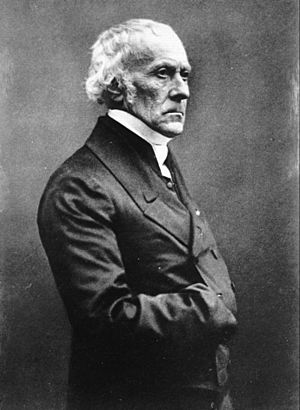
On the afternoon of 23 February 1848, King Louis-Philippe called Guizot and told him that due to the situation in Paris and the country, and the disagreements within the royal family, he doubted he could keep Guizot as prime minister. Guizot immediately resigned. He returned to the chamber only to announce that the government was over and the king had called for Louis-Mathieu Molé to form a new one.
Molé failed to form a government. Between midnight and 1 AM, Guizot, who had gone to bed early, was called back to the Tuileries palace. The king asked for his advice. Guizot replied, "We are no longer your Majesty's ministers. It is up to others to decide what to do. But one thing is clear: this street riot must be stopped; these barricades must be taken. For this, I believe Marshal Bugeaud should be given full power and ordered to take the necessary military actions. Since your Majesty has no minister right now, I am ready to write and sign such an order." The marshal, who was there, agreed, saying, "I have never been beaten yet, and I shall not begin tomorrow. The barricades shall be taken before dawn."
However, Adolphe Thiers and Odilon Barrot decided to withdraw the troops. Guizot found a safe place to hide in Paris for a few days with a miniature painter he had helped. Soon after, he escaped across the Belgian border and then to London, arriving on 3 March. His mother and daughters had already gone ahead, and he settled into a modest home in Pelham Crescent, Brompton.
Even though many people in England disagreed with his recent policies, they welcomed the fallen statesman with great respect. There was talk of him becoming a professor at Oxford, but he could not accept. He stayed in England for about a year, focusing again on writing history. Back in Paris in 1850, Guizot published two more books on the English revolution.
Later Life and Legacy
After resigning as Prime Minister, Guizot left politics for good. He knew his connection to public life was broken and never tried to get back into it. He spent most of his later years at his home, Val Richer, an old monastery near Lisieux in Normandy. His two daughters, who married into the Dutch De Witt family, lived with him. One of his sons-in-law managed the estate. Guizot continued to work hard on his writing, which was his main way of earning a living.
In 1854, Guizot published his Histoire de la république d’Angleterre et de Cromwell. Then came his Histoire du protectorat de Cromwell et du rétablissement des Stuarts in 1856. He also wrote an essay on Robert Peel and many essays on religion. From 1858 to 1868, he published his long work, Mémoires pour servir à l’histoire de mon temps, in nine volumes. His speeches were collected in 1863 in his Histoire parlementaire de la France.
As his grandchildren grew up, he began teaching them French history. These lessons led to his last work, Histoire de France racontée à mes petits enfants (History of France told to my grandchildren). This history covered up to 1789 and was continued to 1870 by his daughter, Madame Guizot de Witt, using his notes.
Learned Societies
Even under the Second French Empire, two institutions remained free: the Institut de France and the Protestant Consistory. Guizot remained active in both until the end of his life. He was a member of three of the five academies within the Institute of France. He helped restore the Academy of Moral and Political Science and became one of its first members in 1832. The Academy of Inscriptions and Belles Lettres elected him in 1833. In 1836, he became a member of the Académie Française, the highest literary honor in France. For nearly forty years, Guizot was very involved in these groups and had a strong influence. He strongly supported their independence. His opinion was very important in choosing new members, and he always encouraged younger French writers. His goal was to maintain the dignity and purity of writing as a profession. In 1842, he was elected a foreign member of the Royal Swedish Academy of Sciences, and in 1855, an honorary member of the American Academy of Arts and Sciences.
Protestant Consistory
Guizot also had a similar influence in the Protestant church in Paris. His early education and life experiences strengthened his religious beliefs. He remained a strong believer in Christian teachings throughout his life. A book called Meditations on the Christian Religion was one of his last works. Although he stayed loyal to his family's church and fought against modern ideas that seemed to threaten it, he was not intolerant. He respected the Church of Rome, which was the faith of most of his countrymen. He loved the writings of great Catholic leaders like Bossuet and Bourdaloue, and often used them in his daily family prayers.
Death and Legacy
Guizot remained mentally sharp and active until the summer of 1874. He died peacefully, reportedly reciting verses from Pierre Corneille and passages from the Bible on his deathbed.
In the 1820s, Guizot was admired by many liberal thinkers in Europe. His historical works, like Histoire générale de la civilisation en Europe (1828) and Histoire de la civilisation en France (1830), were highly praised by people like John Stuart Mill and Johann Wolfgang von Goethe. In 1840, he was elected to the American Philosophical Society.
Guizot's strong opposition to universal suffrage (the idea that everyone should be able to vote) later led some critics to call him conservative. However, it is more accurate to describe him as someone who believed in the juste milieu or political centrism. He defended representative government against both absolute rule and too much democracy. His idea of "sovereignty of reason" aimed to divide and limit power and to strengthen the constitutional gains from the Charter of 1814. He also called for ending the death penalty. His ideas influenced other liberal reformers in Europe.
Recently, scholars like Pierre Rosanvallon and Larry Siedentop have renewed interest in Guizot's political ideas and the Doctrinaires.
Works
- Dictionnaire des synonymes de la langue française, 1809.
- De l’état des beaux-arts en France, 1810.
- Annales de l’éducation, 1811–1815, 6 vol.
- Vie des poètes français du siècle de Louis XIV, 1813.
- Quelques idées sur la liberté de la presse, 1814.
- Du gouvernement représentatif de l’état actuel de la France, 1816.
- Essai sur l’état actuel de l’instruction publique en France, 1817.
- Du gouvernement de la France depuis la Restauration. Des conspirations et de la justice politique, 1820.
- Des moyens de gouvernement et d’opposition dans l’état actuel de la France. Du gouvernement de la France et du ministère actuel. Histoire du gouvernement représentatif en Europe, 1821, 2 vol.
- De la souveraineté, 1822.
- De la peine de mort en matière politique, 1822.
- Essai sur l’histoire de France du Ve s. au Xe s., 1823.
- Histoire de Charles Ier, 1827, 2 vol.
- Histoire générale de la civilisation en Europe, 1828. 2e édition Langlet et Cie, 1838.
- Histoire de la civilisation en France, 1830, 4 vol.
- Le presbytère au bord de la mer, 1831.
- Rome et ses papes, 1832.
- Le ministère de la réforme et le parlement réformé, 1833.
- Essais sur l’histoire de France, 1836.
- Monk, étude historique, 1837.
- De la religion dans les sociétés modernes, 1838.
- Vie, correspondance et écrits de Washington, 1839–1840.
- Washington, 1841.
- Madame de Rumfort, 1842.
- Des conspirations et de la justice politiques, 1845.
- Des moyens de gouvernement et d’opposition dans l’état actuel de la France, 1846.
- Histoire de la révolution d'Angleterre depuis l'avènement de Charles Ier jusqu'à sa mort, 1846.
- M. Guizot et ses amis. De la démocratie en France, 1849.
- Pourquoi la révolution d’Angleterre a-t-elle réussi ? Discours sur l’histoire de la révolution d’Angleterre, 1850.
- Études biographiques sur la révolution d’Angleterre. Études sur les beaux-arts en général, 1851.
- Shakespeare et son temps. Corneille et son temps, 1852.
- Abélard et Héloïse, 1853.
- Édouard III et les bourgeois de Calais, 1854.
- Histoire de la république d’Angleterre, 1855, 2 vol., Sir Robert Peel.
- Histoire du protectorat de Cromwell et du rétablissement des Stuarts, 1856, 2 vol.
- Mémoires pour servir à l’histoire de mon temps, 1858–1867, 8 vol.
- L’Amour dans le mariage, 1860.
- L’Église et la société chrétienne en 1861, Discours académique, 1861.
- Un projet de mariage royal, 1862.
- Histoire parlementaire de France, recueil de discours, , 1863, 5 vol. Trois générations.
- Méditations sur l’essence de la religion chrétienne, 1864.
- Guillaume le Conquérant, 1865.
- Méditations sur l’état actuel de la religion chrétienne, 1866.
- La France et la Prusse responsables devant l’Europe, 1868.
- Méditations sur la religion chrétienne dans ses rapports avec l’état actuel des sociétés et des esprits. Mélanges biographiques et littéraires, 1868.
- Mélanges politiques et historiques, 1869.
- L'Histoire de France : depuis les temps les plus reculés jusqu'en 1789. Racontée à mes petits-enfants, 1870–1875, 5 vol.
- Le duc de Broglie, 1872.
- Les vies de quatre grands chrétiens français, 1873.
- L'Histoire d'Angleterre : depuis les temps les plus reculés jusqu'à l'avènement de la reine Victoria. Racontée à mes petits-enfants, 1877-1878, 2 vol.
See also
Template:KIDDLE XL START  In Spanish: François Guizot para niños Template:KIDDLE XL END
In Spanish: François Guizot para niños Template:KIDDLE XL END
- Aide-toi, le ciel t'aidera
- Le Globe
- Comité des travaux historiques et scientifiques
 | Victor J. Glover |
 | Yvonne Cagle |
 | Jeanette Epps |
 | Bernard A. Harris Jr. |


